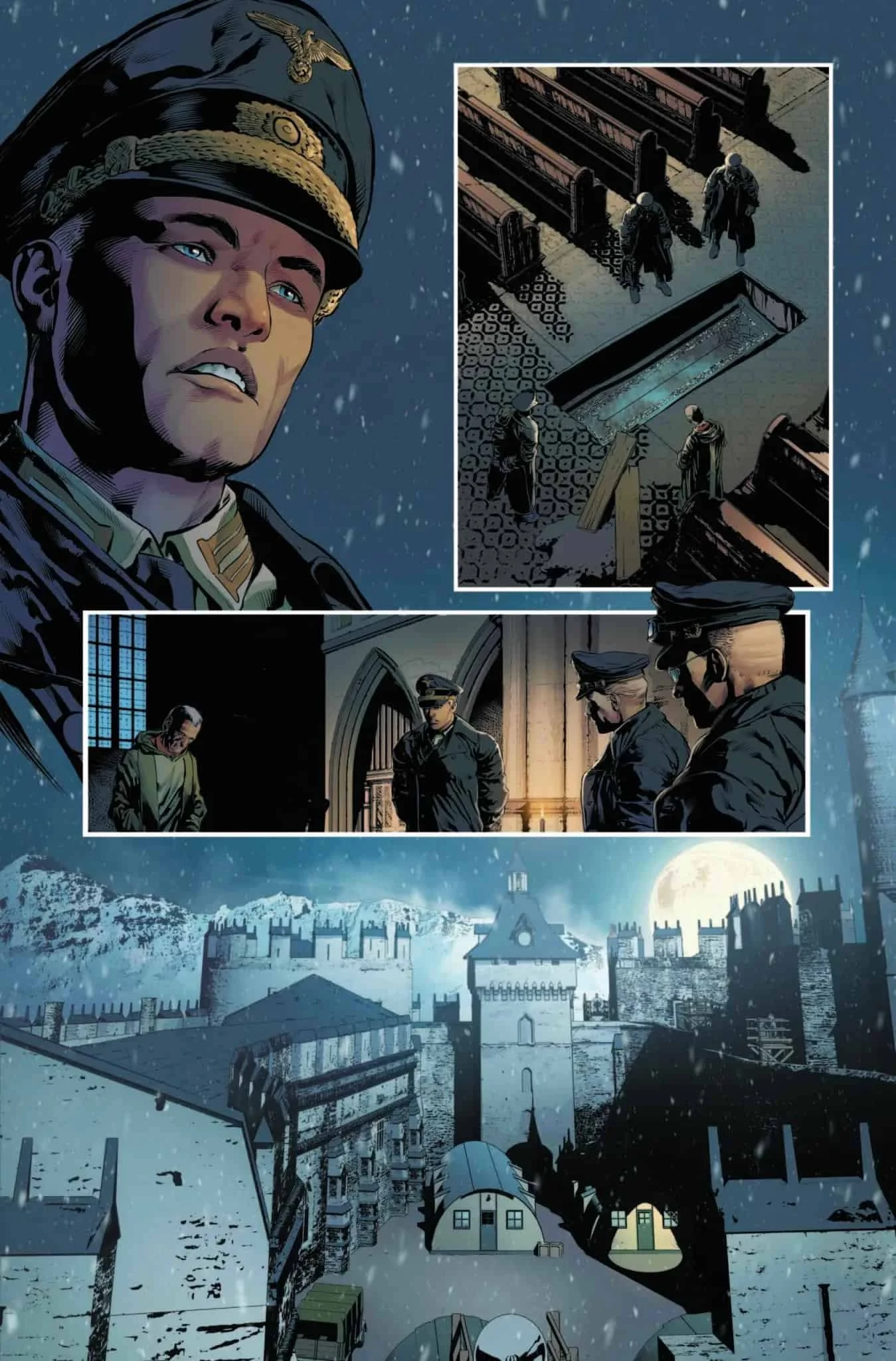Writer: Rob Williams / Penciller: Will Conrad / Colour Artist: Marco Lesko / Letterer: Sal Cipriano / Collects: Out #1 - #5 / SC / AWA Studios
5th November 2022 (Released 16th March 2022)
Review by Paul Dunne
The Pitch: In the waning days of World War Two, with the Allies advancing, a desperate Nazi officer unearths an ancient force of evil that he hopes will turn the tide of battle: a vampire. To test the power of his secret weapon, he unleashes the monster on an unsuspecting group of Allied POWs. It's up to Nocona, a Comanche language expert, to communicate with the vampire to find out what it really wants.
Vampire fiction hasn't been a niche for a while. There was a time in the nineties and early noughties when you couldn't move for it. Book stores, TV, movies, comics. It was everywhere. It fell off a little, but never really went away. As with Superheroes today, it became a genre all its own, no matter how many times marketers bandied the words 'supernatural romance' about. Lately, it seems to have had a resurgence. New blood, so to speak. Now, Vampire fiction set in WWII... is a little more niche. There have been episodes of Angel that touch upon the role of blood suckers’ role in WWII. The Hellboy story Wake The Devil has its starting point an attempted deal between Hitler and a family of Vampires. And the original novel that Michael Mann's The Keep is based on is, I believe, a Vampire story set in WWII. But it's not exactly teeming with life as a genre fusion… Which is a shame, at least for me personally. I love vampire fiction. Along with heist movies, it's probably my favourite. And WWII? Look, being a guy over a certain age (I'm approaching my fifties), I love WWII stories, fact or fiction. I don't fetishise WWII the way a lot of Brits do. I'm under no illusion that war was indeed hell and it was not, for anyone, the best years of their lives. But there is something about it. Maybe it's because, for a time, the country and its citizens felt like winners. Interesting then that Williams chooses to populate his WWII Vampire comic with losers – the ones who got caught. And of course, the Nazis themselves, set as the story is in the waning days of the conflict, with the allies about to enter Berlin. And within this, he and Conrad essay more outsiders. Nocona, the Native-American code talker. And his would-be lover, another prisoner of war. Interesting. And so much the better.
There are shades of another genre here – the western – with Nocona's maneuvering echoing Eastwood's chess playing in a Fistful of Dollars.
Even in a story such as this, there's no question as to who the real monsters are. Even though the Vampire and The Nazis see themselves in pretty much the same way, deposed kings of a bygone world they wish to bring back, it's the Nazis who happily throw their prisoners out in front of a carnivorous creature like cattle. Everyone in the book has an agenda, even if that agenda is simply survival. Nocona is smart enough to use others’ agendas against them. Seen as a traitor by the British and American military, he does the Nazi's bidding, but secretly makes deals with the Vampire. There are shades of another genre here – the western – with Nocona's manoeuvring echoing Eastwood's chess playing in a Fistful of Dollars. He pits one against the other until he gets the upper hand, yet he's still willing to make the personal sacrifice. Out becomes a book about how people use language and the lack of knowledge of languages to lie to each other. And even to themselves, as Nocona and McCallum find themselves unable to express their feelings. The book’s title becomes a play on words, then. Not only are the POWs trying to get out of the castle they're held in, but Nocona and McCallum are trapped in a second prison, one which given the time and place they're in, they'll never escape from, even if they manage to break out of the Nazi's grip. With so many dangerous deals and agendas happening in the book, you begin to hope that Nocona and McCallum could engineer some time for themselves. Instead, they are reduced to a few mere moments and glances. Another tragedy to add to the list.
Conrad creates a gorgeously gothic look that helps build atmosphere and mood.
Williams’ plotting is superb. He keeps everything contained within the walls of the castle, adding the ticking clock of the Allies entering Berlin. The plot winds tighter as Nocona is drafted to be the go-between The Vampire and The Nazis. Williams has a knack for creating impossible moral situations for his characters, as witnessed in his Suicide Squad and Judge Dredd runs. He's not afraid to dig into dark places for the people in his books. Conrad also creates dark places of cold stone and candlelight. His Vampire barely looks human and might be more at home running around the corridors of The Nostromo. As the fallen king tastes more blood, his form begins to coalesce. Conrad creates a gorgeously gothic look that helps build atmosphere and mood. Lesko's colouring seals the deal, lighting the images nicely, giving the shadows depth, and adding that extra layer of creep needed for them to work as the story shifts from WWII thriller to horror and back again. Cipriano's letters handle the accents and distinct voices perfectly, bringing a reality to William's script. Out is a dip into the past to create a morally complex modern story that stands as one of the better modern Vampire comics in recent years. He's hoping the team gets to revisit these themes and times again and inject more new blood where it's needed.
Out is available in trade paperback from your local comic shop now.




